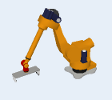Robot
Overview and Key Concepts
The robot is a special transport that lifts flow items from their starting locations and places them at their ending locations. Generally, the robot's base does not move. Instead, 6 joints rotate to move the flow items.

The robot is a task executer. It implements offset travel by rotating its joints. Note that by default, the x/y/z location of the robot does not change at all when it does offset travel. If the destination location is further away than the robot's maximum arm extension, then the robot will only extend its arm up to its maximum extension. It does not use the standard task executer maximum speed, acceleration and deceleration values.
The robot by default does not connect itself to a navigator, which means that it does not execute travel tasks unless you explicitly connect it to a network.
Events
The robot uses the standard events that are common to all task executers. See Task Executer Concepts - Events for an explanation of these events.
States
This object uses the task executer states. See Task Executer Concepts - States for more information.
Statistics
The robot uses the standard statistics that are common to all task executers. See Task Executer Concepts - Statistics for an explanation of these statistics.
Properties Panels
The Robot object uses the following properties panels:
Properties
The Robot object shares several properties with all task executers:
Additionally, the Robot object uses the following properties:
| Property | Type |
|---|---|
| JointSpeeds | |
| MotionMode | Options |
| MoveTime | Unit Code |
| YRotationSpeed | Unit |
| ZRotationSpeed | Unit |